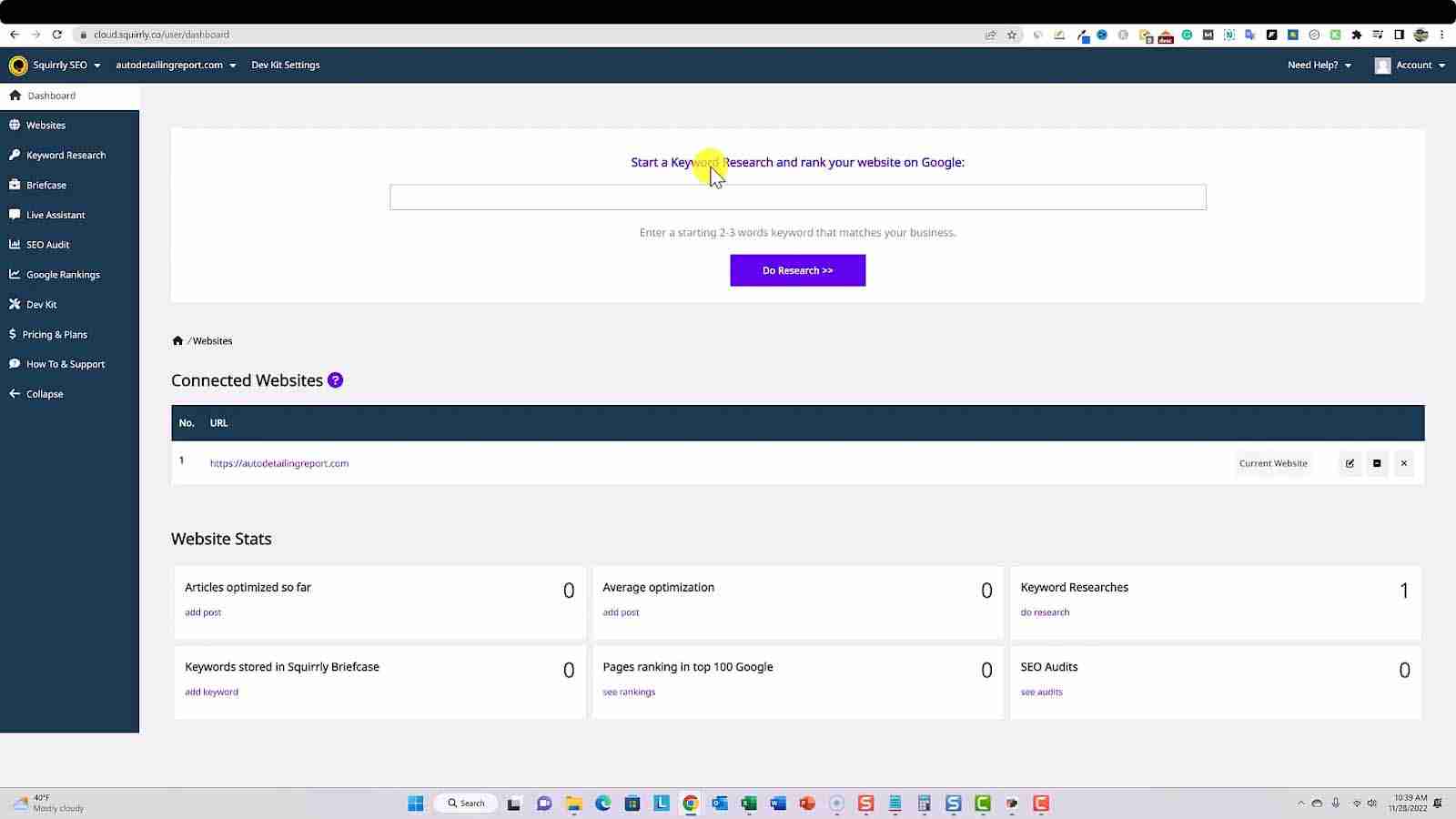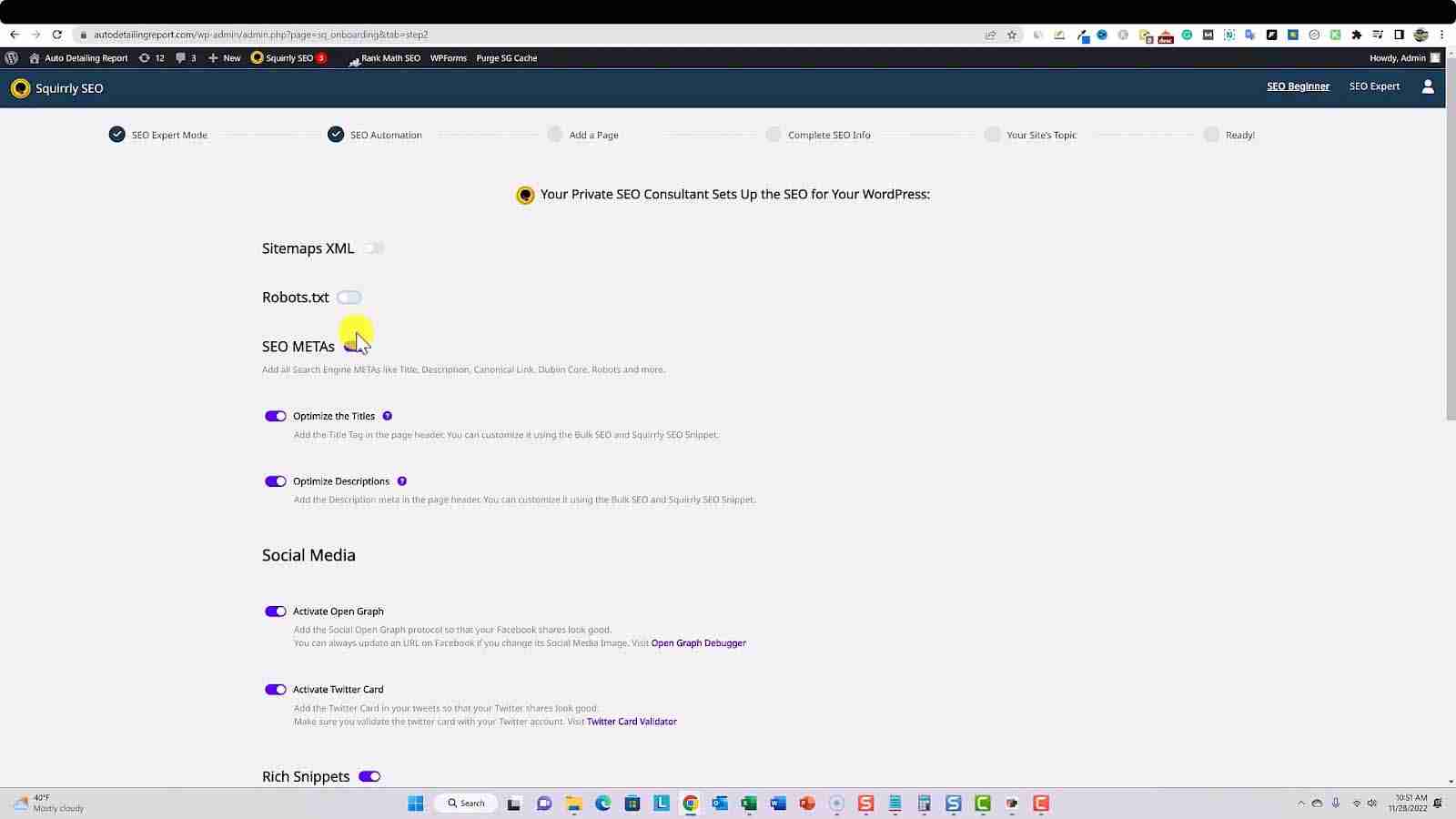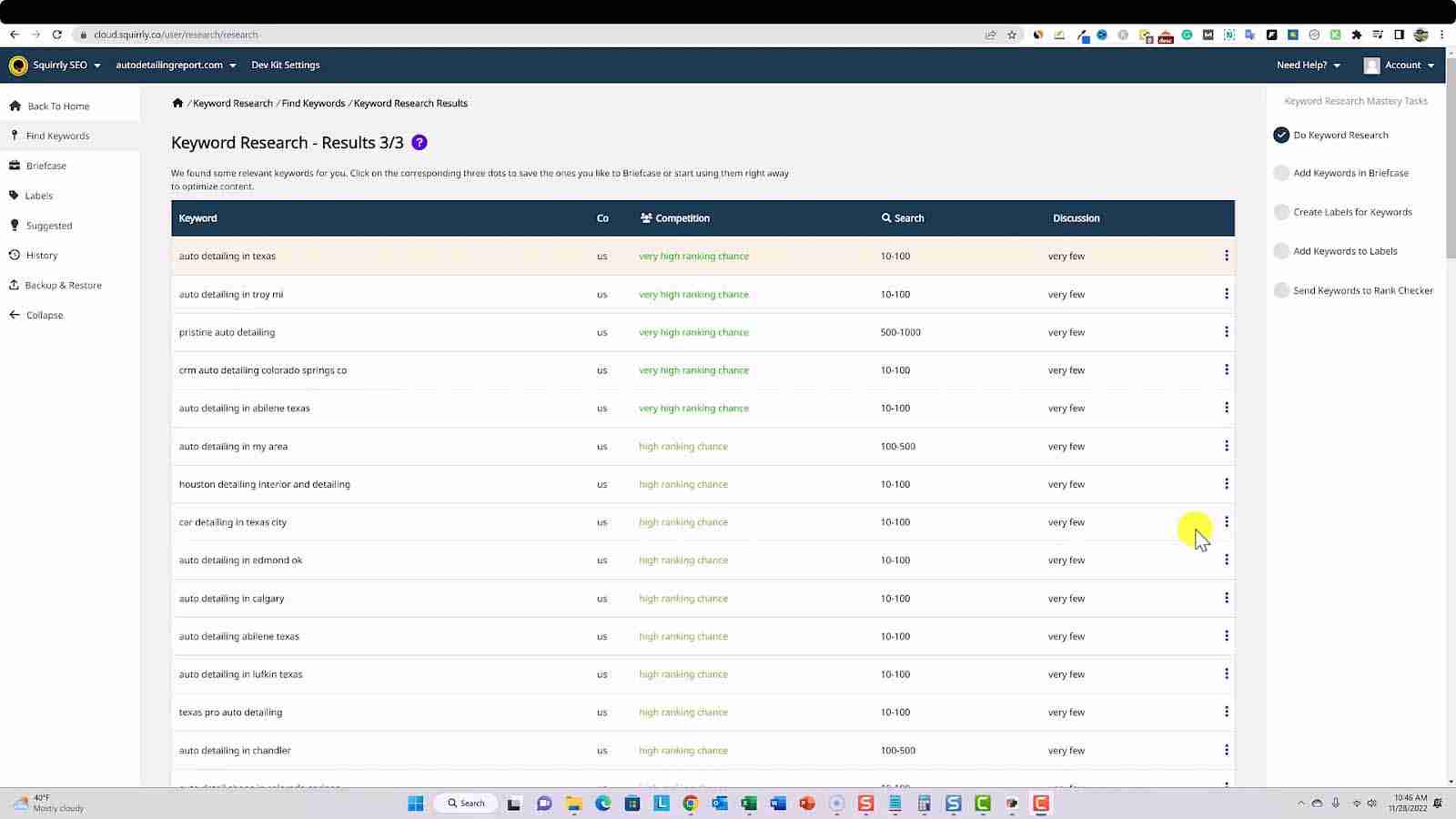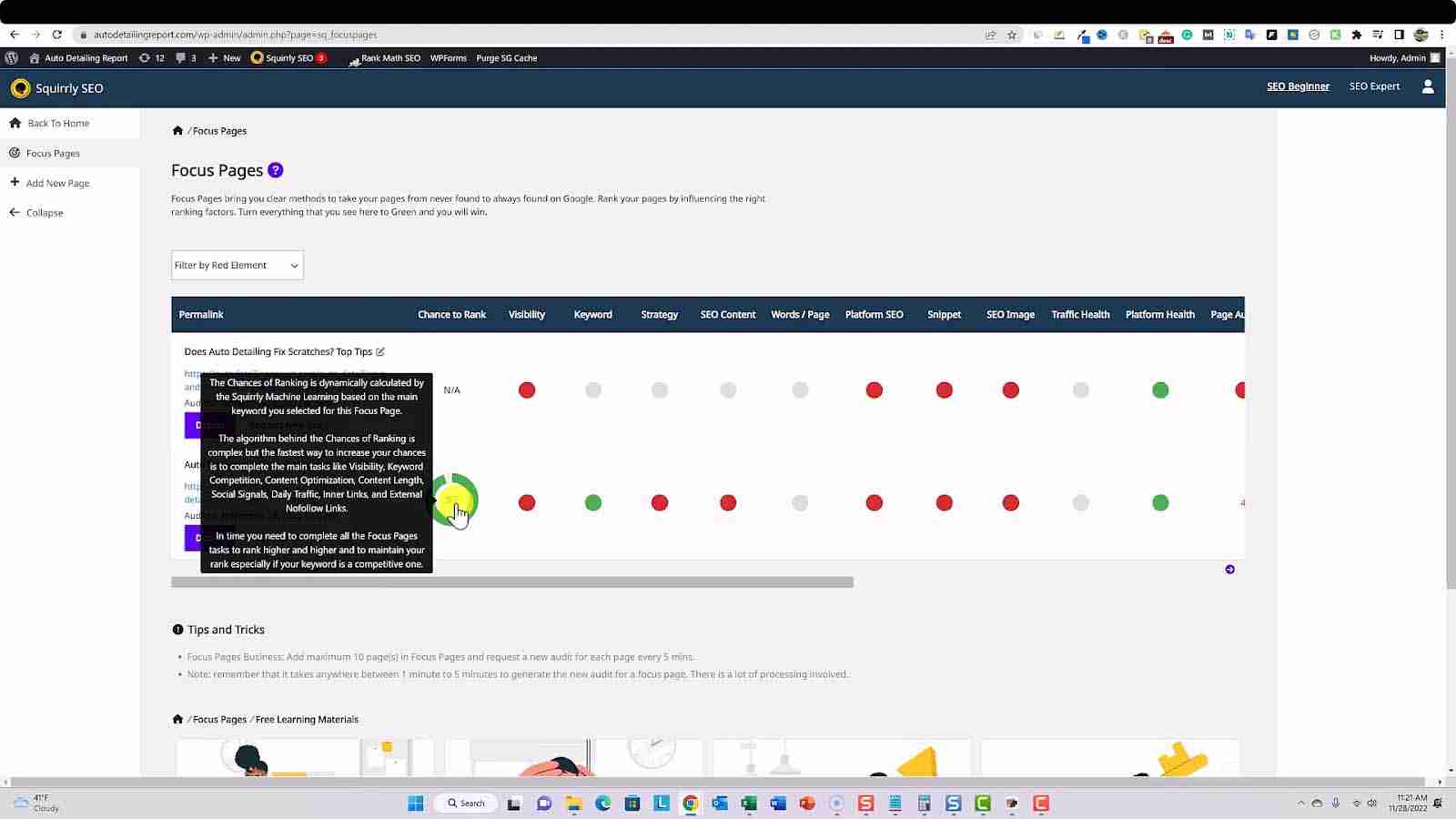My Squirrly SEO Review in 2025: My Honest Take After Years of Use
Is Squirrly SEO the right plugin for you? Check out my honest Squirrly SEO review after years of use to see if this powerhouse tool is worth the investment.

I’ve been in the software game for a long time, and I’m always on the lookout for tools that can give my niche sites an edge. I first picked up Squirrly SEO during a Black Friday sale on AppSumo, and I’ve been using it on and off ever since. It's a powerhouse tool, but it's not for everyone, and in this review, I’m going to break down exactly who I think it’s for.
This post will cover my honest thoughts on its features, the good, the bad, and who should ultimately hit that "buy" button. For a complete walkthrough, feel free to watch my full video review below.
What is Squirrly SEO?
So, what exactly is Squirrly SEO? Think of it as an all-in-one SEO suite for your WordPress site. It’s a direct competitor to popular plugins like Yoast and Rank Math, but it aims to do a lot more. It combines a WordPress plugin with a cloud-based application, which means you get tools for on-page optimization, technical SEO, keyword research, SEO audits, and even rank tracking all under one roof.
The whole idea is to give you everything you need to manage and improve your site’s SEO without having to subscribe to a half-dozen different services like Ahrefs or Semrush. It’s ambitious, and it’s packed with over 650 features, according to their site.
My Squirrly SEO Set Up and First Impressions
Getting started with Squirrly was straightforward. You download the plugin file from their site, upload it to your WordPress dashboard, and hit activate. Simple enough. However, I did run into a weird little bug during my initial setup. After trying to log in through the plugin, it kept giving me a password error. But, after a little frustration, I realized I was actually already logged in and the tool was active. A bit confusing, but not a deal-breaker.
Once inside, my first impression was that this tool is massive. The user interface, both in the WordPress backend and the separate Squirrly Cloud app, is loaded with options. It can feel a bit overwhelming, to be honest. It's clear this isn't a lightweight, set-it-and-forget-it plugin; it's a deep tool designed for people who want to get granular with their SEO. The learning curve is real, but if you're willing to put in the time, the power is there.

Squirrly SEO Features I Use Most
Squirrly is jam-packed with features, and it would take an hour-long video to cover every single one. Instead of doing that, I’m going to focus on the key features that I find myself using the most and that provide the biggest impact on my SEO workflow.
Here's a breakdown of the tools within Squirrly that have become part of my regular process.
Daily SEO Goals
While Squirrly doesn't have a feature explicitly named "Daily SEO Goals," the Focus Pages function serves this exact purpose. This is one of the standout features of the plugin. You pick the most important pages on your site that you want to rank, and Squirrly puts them under a microscope.
For each Focus Page, it gives you a checklist of tasks. It analyzes your page against the top-ranking competition and tells you exactly what to do next. It might tell you to add certain keywords, improve your internal linking, or fix a technical issue. It turns SEO into an actionable, step-by-step process, which is great for staying on track.

Keyword Research Tool
I’ve used the keyword research tool both in the cloud app and directly in WordPress. You pop in a seed keyword, and it spits out a list of related terms, color-coded by their "ranking chance" – green for high chance, yellow for modest, and red for difficult. It’s a decent starting point for finding opportunities.
My main gripe with the workflow is that it feels a bit clunky. To track a keyword, you first have to do the research, then add your chosen keywords to a feature called the "Briefcase," and then send them to the rank tracker. I wish I could just add keywords directly to the rank tracker. It’s a small thing, but it would make the process smoother.

Focus Pages
I touched on this already, but it's worth its own section because it’s the core of the Squirrly strategy. When I was building out a post for "auto detailing in Texas" on a case study site, I immediately set it as a Focus Page.
Squirrly gave me a "chance to rank" score and a list of red, yellow, and green tasks. It told me things like my content optimization was strong, but my visibility was low (because it wasn't indexed yet). Following these tasks gives you a clear path to improving a page's SEO. This is the most powerful and practical feature in the entire suite, in my opinion.

SEO Audit
The SEO Audit feature is another solid tool. With a click, it runs a comprehensive audit of your website, looking at on-page elements, technical health, and even some off-page metrics.
When I ran it on my case study site, it gave me an overall score and highlighted specific issues. For example, it correctly pointed out that I was missing social sharing buttons and had duplicate meta descriptions on some pages. It’s a great way to get a high-level overview of your site’s health and identify quick wins.
SEO Live Assistant
This is Squirrly’s on-page content optimization tool, and it works in real-time as you write in the WordPress editor. A little assistant sits in a sidebar and gives you a live SEO score, turning tasks green as you complete them.
While writing my "auto detailing" post, it guided me to include my keyword in the title, URL, and meta description. It also warned me about keyword stuffing, which is helpful. I was able to get the post to a 71% optimization score pretty quickly just by following its suggestions. It's like having an SEO coach looking over your shoulder.
Blogging AI Assistant
Squirrly also includes a Blogging AI Assistant meant to help with content creation. It can pull in images, suggest related questions, and grab snippets from places like Wikipedia.
To be honest, I found this feature to be the least useful. When I tried to find an image for my auto detailing post, the suggestions were completely irrelevant—no cars in sight. While the idea is good, the execution didn't quite hit the mark for me, and I found it easier to just source my own media.
What I Like About Squirrly SEO (Pros)
- Truly All-in-One: It combines keyword research, rank tracking, audits, and on-page SEO into one package. This can replace several other paid tools.
- Actionable Guidance: The Focus Pages feature is brilliant. It turns vague SEO goals into a clear, actionable to-do list for your most important content.
- Long-Term Company: Squirrly has been around for over 10 years. They aren’t a fly-by-night startup, and they continuously update the tool.
- The Lifetime Deal: When it's available on AppSumo, the value is incredible. Paying once for a tool this powerful is a huge win for any bootstrapped business or agency.
What I Didn’t About Squirrly SEO (Cons)
- Overwhelming Interface: With over 650 features, the dashboard can be a maze. It’s not a tool for the faint of heart and can be intimidating for beginners.
- Clunky Workflow: Some processes, like adding keywords to the rank tracker, feel like they have too many steps.
- Occasional Bugs: I experienced a frustrating login issue during the initial setup, which suggests there might be some minor bugs to iron out.
- Underwhelming Assistant: The Blogging AI Assistant, particularly its image suggestions, didn't add much value to my workflow.
How Much Does Squirrly SEO Cost?
Squirrly SEO has a few different pricing structures. When it’s available on platforms like AppSumo, you can often snag a lifetime deal, which is what I did. The deals usually start around $79 for a handful of sites and go up from there for more sites and higher usage limits.
For their standard pricing, they offer several tiers, including a free plan. Here’s a general look at their subscription plans:
| Plan | Price | Best For |
|---|---|---|
| Free | $0 | Bloggers and newbies just starting out with 1 site. |
| Pro | ~$9.99 | Business owners and freelancers managing up to 5 sites. |
| Business | ~$71.99 | Marketers and businesses that need more power, managing up to 7 sites with higher limits. |
| Web Dev Kit | ~$51.20 | Agencies that need to manage client sites with customizable features. |
Who Should (And Shouldn’t) Use Squirrly SEO
You should use Squirrly SEO if:
- You are an intermediate to advanced SEO who wants deep, granular control over your website's optimization.
- You run an agency or manage a portfolio of websites and want an all-in-one tool to streamline your work.
- You love data and want an actionable, task-based approach to improving your rankings.
- You can get your hands on the lifetime deal, making it a fantastic long-term investment.
You probably shouldn’t use Squirrly SEO if:
- You are a complete beginner to SEO. The sheer number of options will likely be overwhelming.
- You just want a simple, "fire-and-forget" plugin to handle basic on-page titles and metas.
- You are easily frustrated by complex user interfaces and occasional workflow quirks.
Is Squirrly SEO Worth It in 2025?
So, let's cut to the chase. Is Squirrly SEO worth it? Yes, I believe it is, but with a big condition: it’s for the serious user. If you're just looking to set your meta descriptions, a free tool like Yoast or Rank Math is probably enough.
But if you want to replace multiple SEO tools and have a single platform that gives you a strategic, data-driven roadmap for ranking your most important pages, Squirrly is a beast. Especially if you can grab the lifetime deal, the value is almost impossible to beat. It’s a tool you can grow into, and its focus on turning SEO into a set of manageable tasks is its greatest strength.
Squirrly SEO Alternatives
While Squirrly is a powerful option, it's not the only SEO plugin out there. The market is full of great tools, each with its own strengths. It’s smart to know what your options are before making a decision.
Here's a look at some of the top alternatives and why you might consider them.
Yoast SEO
Yoast is one of the most popular WordPress plugins of all time, and for good reason. It’s incredibly beginner-friendly and makes on-page SEO simple with its traffic light system. If the complexity of Squirrly scares you and you just need a reliable tool to handle your titles, metas, and sitemaps, Yoast is a fantastic choice. We think it’s a great alternative for those who prioritize ease of use over an exhaustive feature set.
SEOPress
SEOPress is another strong all-in-one plugin that strikes a nice balance between power and simplicity. One of its standout features is that it’s completely white-label, making it a favorite among agencies who build sites for clients. It offers a robust set of features, including schema support and redirection, without the ads and upsells you see in some other plugins. It's a great alternative for professionals looking for a clean, powerful, and client-friendly tool.
RankMath
Rank Math has quickly become a major competitor to Yoast and Squirrly, largely by offering an incredible number of features in its free version. It feels more modern than Yoast and offers advanced functionality like a schema generator and a 404 monitor out of the box. For those who want more power than Yoast but find Squirrly's all-in-one approach a bit too much, Rank Math is the perfect middle ground.
AIOSEO
All in One SEO (AIOSEO) is another one of the originals and has a massive user base. It has evolved over the years to become a comprehensive toolkit with features like TruSEO on-page analysis, rich snippets schema, and local SEO modules. AIOSEO is a solid, reliable alternative that competes directly with Squirrly and Rank Math on features, offering a strong package for business owners looking to improve their online presence.
The SEO Framework
If all the other plugins feel too bloated, The SEO Framework is the answer. It’s designed to be lightweight, fast, and unbranded. It focuses on providing the essential SEO tools you need without slowing down your site or cluttering your dashboard with ads. This is the perfect alternative for developers or purists who want strong SEO fundamentals without all the bells and whistles.
FAQs
Is Squirrly SEO beginner-friendly?
Honestly, not really. While it has an "easy mode," the sheer volume of features and settings can be overwhelming for someone new to SEO. It's better suited for intermediate to advanced users who are comfortable with SEO concepts.
Is Squirrly SEO free or paid?
Squirrly SEO offers both. They have a limited free version available on the WordPress plugin directory, which is a good way to test it out. However, to unlock its most powerful features like Focus Pages and the full audit suite, you'll need one of their paid premium plans.
Is Squirrly SEO better than Yoast?
This depends on what you need. Squirrly is more comprehensive, offering built-in keyword research, rank tracking, and site audits that Yoast doesn't have. Yoast is more user-friendly and excels at providing simple, clear on-page optimization guidance. For an all-in-one powerhouse, Squirrly is better. For straightforward, easy-to-use on-page SEO, Yoast is better.

